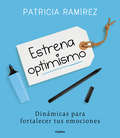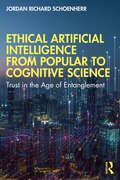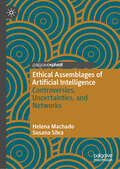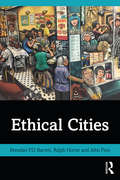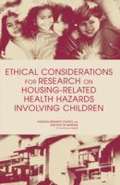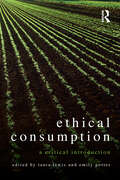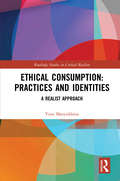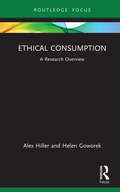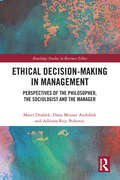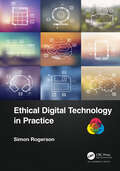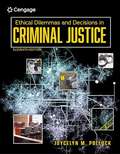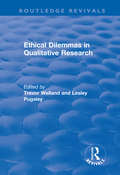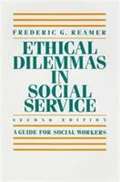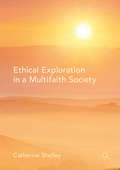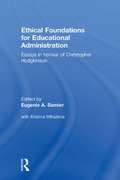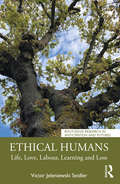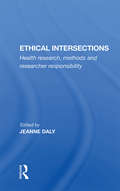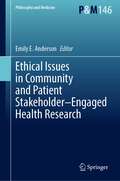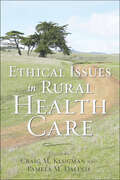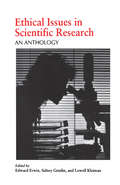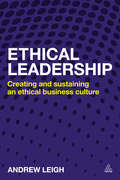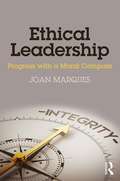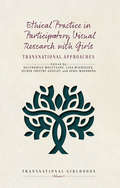- Table View
- List View
Estrena optimismo
by Patricia RamírezLa vida no es perfecta, pero tu actitud sí puede serlo. El nuevo libro de Patricia Ramírez incluye dinámicas y muchos ejercicios prácticos. Si hasta ahora no has estrenado optimismo, estás de suerte... ¡Hay un montón de optimismo para ti! Ser optimista no te asegura el éxito, pero te ayuda a alcanzarlo. La persona optimista invierte esfuerzo y trabajo en lo que cree que puede tener salida y posee algo muy importante: esperanza. Eso le da ánimo y motivación para seguir intentándolo. El optimismo no se compra, pero sí se puede entrenar, como se entrena la fuerza, la estrategia o la flexibilidad. Y ahora tienes en las manos un libro divertido y práctico que te permitirá cambiar tu estado de ánimo a través de 40 dinámicas. ¡Manos a la obra! Todos tenemos problemas y a veces nos parecen incluso insalvables. Pero la manera en que nos enfrentamos a ellos diferencia al ganador del perdedor, al «disfrutón» del que vive en la apatía y la tristeza constante. Pensar de forma optimista requiere un esfuerzo mayor que hacerlo de forma catastrófica, porque nuestro cerebro tiene una tendencia natural a hacerlo así. Pero recuerda que también posee una cualidad muy importante, la plasticidad. Aprende constantemente y no solo a realizar una nueva receta o a mejorar una habilidad deportiva sino también aprende nuevas formas de pensar y de sentir. Y esa es la base del optimismo. Las 40 dinámicas y ejercicios prácticos que encontrarás en este libro te permitirán entrenar tu optimismo desde el primer día.
Ethical Artificial Intelligence from Popular to Cognitive Science: Trust in the Age of Entanglement
by Jordan Richard SchoenherrThis book offers a unique interdisciplinary perspective on the ethics of 'artificial intelligence' – autonomous, intelligent, (and connected) systems, or AISs, applying principles of social cognition to understand the social and ethical issues associated with the creation, adoption, and implementation of AISs. As humans become entangled in sociotechnical systems defined by human and artificial agents, there is a pressing need to understand how trust is created, used, and abused. Compounding the difficulty in answering these questions, stakeholders directly or indirectly affected by these systems differ in their motivations, understanding, and values. This volume provides a comprehensive resource to help stakeholders understand ethical issues of designing and implementing AISs using an ethical sensemaking approach. Starting with the general technical affordances of AIS, Dr. Jordan Richard Schoenherr considers the features of system design relating data integrity, selection and interpretation of algorithms, and the evolution processes that drive AISs innovation as a sociotechnological system. The poles of technophobia (algorithmic aversion) and technophilia (algorithmic preference) in the public perception of AISs are then described and considered against existing evidence, including issues ranging from the displacement and re-education needs of the human workforce, the impact of use of technology on interpersonal accord, and surveillance and cybersecurity. Ethical frameworks that provide tools for evaluating the values and outcomes of AISs are then reviewed, and how they can be aligned with ethical sensemaking processes identified by psychological science is explored. Finally, these disparate threads are brought together in a design framework. Also including sections on policies and guideline, gaming and social media, and Eastern philosophical frameworks, this is fascinating reading for students and academics in psychology, computer science, philosophy, and related areas, as well as professionals such as policy makers and those working with AI systems.
Ethical Artificial Intelligence from Popular to Cognitive Science: Trust in the Age of Entanglement
by Jordan Richard SchoenherrThis book offers a unique interdisciplinary perspective on the ethics of 'artificial intelligence' – autonomous, intelligent, (and connected) systems, or AISs, applying principles of social cognition to understand the social and ethical issues associated with the creation, adoption, and implementation of AISs.As humans become entangled in sociotechnical systems defined by human and artificial agents, there is a pressing need to understand how trust is created, used, and abused. Compounding the difficulty in answering these questions, stakeholders directly or indirectly affected by these systems differ in their motivations, understanding, and values. This volume provides a comprehensive resource to help stakeholders understand ethical issues of designing and implementing AISs using an ethical sensemaking approach. Starting with the general technical affordances of AIS, Dr. Jordan Richard Schoenherr considers the features of system design relating data integrity, selection and interpretation of algorithms, and the evolution processes that drive AISs innovation as a sociotechnological system. The poles of technophobia (algorithmic aversion) and technophilia (algorithmic preference) in the public perception of AISs are then described and considered against existing evidence, including issues ranging from the displacement and re-education needs of the human workforce, the impact of use of technology on interpersonal accord, and surveillance and cybersecurity. Ethical frameworks that provide tools for evaluating the values and outcomes of AISs are then reviewed, and how they can be aligned with ethical sensemaking processes identified by psychological science is explored. Finally, these disparate threads are brought together in a design framework.Also including sections on policies and guideline, gaming and social media, and Eastern philosophical frameworks, this is fascinating reading for students and academics in psychology, computer science, philosophy, and related areas, as well as professionals such as policy makers and those working with AI systems.
Ethical Assemblages of Artificial Intelligence: Controversies, Uncertainties, and Networks
by Helena Machado Susana SilvaThis book critically examines the ethical challenges of Artificial Intelligence (AI), focusing on facial recognition and AI-assisted reproductive technologies. It explores how these issues intertwine with social and political processes and power dynamics in digital societies. What defines ethical versus unethical in the realm of AI? Why do some ethical debates dominate, while others are overlooked? Which actors and institutions align or diverge in these discussions? To address these questions, the authors introduce the concept of "ethical assemblages," offering fresh perspectives on the complexities of AI ethics and their impact on socio-technoscientific structures.
Ethical Cities
by Ralph Horne John Fien Brendan F.D. BarrettCombining elements of sustainable and resilient cities agendas, together with those from social justice studies, and incorporating concerns about good governance, transparency and accountability, the book presents a coherent conceptual framework for the ethical city, in which to embed existing and new activities within cities so as to guide local action. The authors’ observations are derived from city-specific surveys and urban case studies. These reveal how progressive cities are promoting a diverse range of ethically informed approaches to urbanism, such as community wealth building, basic income initiatives, participatory budgeting and citizen assemblies. The text argues that the ethical city is a logical next step for critical urbanism in the era of late capitalism, characterised by divisive politics, burgeoning inequality, widespread technology-induced disruptions to every aspect of modern life and existential threats posed by climate change, sustainability imperatives and pandemics. Engaging with their communities in meaningful ways and promoting positive transformative change, ethical cities are well placed to deliver liveable and sustainable places for all, rather than only for wealthy elites. Likewise, the aftermath of shocks such as the 2008 Global Financial Crisis and the Covid-19 pandemic reveals that cities that are not purposeful in addressing inequalities, social problems, unsustainability and corruption face deepening difficulties. Readers from across physical and social sciences, humanities and arts, as well as across policy, business and civil society, will find that the application of ethical principles is key to the pursuit of socially inclusive urban futures and the potential for cities and their communities to emerge from or, at least, ameliorate a diverse range of local, national and global challenges.
Ethical Considerations For Research On Housing-related Health Hazards Involving Children
by Families Youth Committee on Ethical Issues in Housing-Related Health Hazard Research Involving ChildrenEthical Considerations for Research on Housing-Related Health Hazards Involving Children explores the ethical issues posed when conducting research designed to identify, understand, or ameliorate housing-related health hazards among children. Such research involves children as subjects and is conducted in the home and in communities. It is often conducted with children in low-income families given the disproportionate prevalence of housing-related conditions such as lead poisoning, asthma, and fatal injuries among these children. This book emphasizes five key elements to address the particular ethical concerns raised by these characteristics: involving the affected community in the research and responding to their concerns; ensuring that parents understand the essential elements of the research; adopting uniform federal guidelines for such research by all sponsors (Subpart D of 45 CFR 46); providing guidance on key terms in the regulations; and viewing research oversight as a system with important roles for researchers, IRBs and their research institutions, sponsors and regulators of research, and the community.
Ethical Consumption: A Critical Introduction (Media, Culture And Social Change In Asia Ser.)
by Emily Potter Tania LewisA not-so-quiet revolution seems to be occurring in wealthy capitalist societies - supermarkets selling ‘guilt free’ Fairtrade products; lifestyle TV gurus exhorting us to eat less, buy local and go green; neighbourhood action groups bent on ‘swopping not shopping’. And this is happening not at the margins of society but at its heart, in the shopping centres and homes of ordinary people. Today we are seeing a mainstreaming of ethical concerns around consumption that reflects an increasing anxiety with - and accompanying sense of responsibility for - the risks and excesses of contemporary lifestyles in the ‘global north’. This collection of essays provides a range of critical tools for understanding the turn towards responsible or conscience consumption and, in the process, interrogates the notion that we can shop our way to a more ethical, sustainable future. Written by leading international scholars from a variety of disciplinary backgrounds - and drawing upon examples from across the globe - Ethical Consumption makes a major contribution to the still fledgling field of ethical consumption studies. This collection is a must-read for anyone interested in the relationship between consumer culture and contemporary social life.
Ethical Consumption: A Realist Approach (Routledge Studies in Critical Realism)
by Yana ManyukhinaThis book engages with the topic of ethical consumption and applies a critical-realist approach to explore the process of becoming and being an ethical consumer. By integrating Margaret Archer’s theory of identity formation and Christian Coff’s work on food ethics, it develops a theoretical account explicating the generative mechanism that gives rise to ethical consumer practices and identities. The second part of the book presents the findings from a qualitative study with self-perceived ethical food consumers to demonstrate the fit between the proposed theoretical mechanism and the actual experiences of ethically committed consumers. Through integrating agency-focused and socio-centric perspectives on consumer behaviour, the book develops a more comprehensive and balanced approach to conceptualising and studying consumption processes and phenomena.
Ethical Consumption: A Research Overview (State of the Art in Business Research)
by Helen Goworek Alex HillerArising from foundations in green and eco-consumerism, ethical consumption is a multidisciplinary area of research. This shortform book presents an expert view of the empirical evidence on ethical consumption, incorporating perspectives from marketing, psychology and sociology. It takes both a historical and a thematic perspective, covering definitions of ethical consumption, typologies of ethical consumer practices, successes brought about from consumer actions and the current challenges. It also focuses on the emergence of contemporary perspectives on ethical consumer behaviour from three discrete perspectives: those focusing on consumer segmentation (the profiling of ethical consumers), those which take a psychological approach (the decision- making processes which underpin ethical consumption) and those which are sociological in nature (the identities and practices which underpin ethical consumption). The book finally synthesises these perspectives in the context of the ‘problems’ that are often claimed to exist, such as the existence of the ‘attitude– behaviour gap’, and provides conclusions which make recommendations for practice and further research. It will be of interest to academics and students of marketing, consumption and related fields, as well as to practitioners and policymakers who want to understand more about the evidence pertaining to ethical consumers, what motivates them, and how to encourage and educate them to consume more ethically.
Ethical Decision-Making in Management: Perspectives of the Philosopher, the Sociologist and the Manager (Routledge Studies in Business Ethics)
by Adriana Rejc Buhovac Matej Drašček Dana Mesner AndolšekMoral pragmatism has been largely ignored in Business Ethics, despite its natural attraction and the fact that it is prominent in philosophy and socio-economic theories. The main premise of the book is that the complexity of today’s business world does not permit a grand ethical theory, notwithstanding the different attempts made by scientists. Moral pragmatism is the ‘go-to’ approach where the ethical decision-making of managers varies dependent on different circumstances but it always integrates moral considerations. Ethical decision-making is no longer based simply on known rules, but entails the constant dynamic interaction of circumstances, the development of new rules, managers’ past experiences, their knowledge concerning ethics, and skills of moral reasoning. This book interweaves the postmodern approach to management studies and, based on its innovative research, reintroduces moral pragmatism in Business Ethics. The combination of decision-making theories, philosophy and postmodernism paves the way for future novel research in Business Ethics, making it an excellent resource for researchers, academics, and advanced students in the field of Business Ethics. Practitioners, on the other hand, will benefit by improving their skills in ethical decision-making and leadership.
Ethical Decision-Making in Management: Perspectives of the Philosopher, the Sociologist and the Manager (Routledge Studies in Business Ethics)
by Adriana Rejc Buhovac Matej Drašček Dana Mesner AndolšekMoral pragmatism has been largely ignored in Business Ethics, despite its natural attraction and the fact that it is prominent in philosophy and socio-economic theories. The main premise of the book is that the complexity of today’s business world does not permit a grand ethical theory, notwithstanding the different attempts made by scientists. Moral pragmatism is the ‘go-to’ approach where the ethical decision-making of managers varies dependent on different circumstances but it always integrates moral considerations. Ethical decision-making is no longer based simply on known rules, but entails the constant dynamic interaction of circumstances, the development of new rules, managers’ past experiences, their knowledge concerning ethics, and skills of moral reasoning.This book interweaves the postmodern approach to management studies and, based on its innovative research, reintroduces moral pragmatism in Business Ethics. The combination of decision-making theories, philosophy and postmodernism paves the way for future novel research in Business Ethics, making it an excellent resource for researchers, academics, and advanced students in the field of Business Ethics. Practitioners, on the other hand, will benefit by improving their skills in ethical decision-making and leadership.
Ethical Digital Technology in Practice
by Simon RogersonThis is an important book. Ethics is not an easy topic, and arguably the ethics of IT is less so—not leastdue to its potential for developing and evolving in ways that are either unforeseen or unimaginable . . . . Use this book as a practical resource, an informative and educational source of material in developing expertise, but also as an invaluable toolkit to support practical application of ethical thinking. —Declan Brady, President of the Irish Computer Society and a member of the Board of Directors of the Council of European Professional Informatics Societies Digital technology is about people. It is about those who plan, develop and implement applications which other people use and are affected by. It is about the impact on all these people as well as on the world at large. Ethical Digital Technology in Practice takes a real-world perspective to explore these impacts over time and discover ways in which to promote ethical digital technology through good practice. It draws upon the author’s published articles in trade magazines, professional journals and online blogs. These are synthesised into a blueprint which addresses, in a practical manner, the societal issues surrounding the increasing use and abuse of digital technology. It is a follow-up book to the author’s book The Evolving Landscape of Ethical Digital Technology, which has a researcher’s perspective. This book is a hands-on account of the computer revolution from 1995 to the current day when the world is increasingly dependent on digital technology. It explores some of the social and ethical issues that are part of this revolution. This is not a book about deep philosophical and technical concepts. Nor does it claim to be comprehensive. It is the author’s personal account of technological change and its effects on people. It is written by a boy who was smitten by computer technology at the age of 15, became a computer professional and subsequently spent many years showing young people how to develop and use digital technology in a good way. It is a book based upon the author’s engagement with practitioners, academics and students during the period as well as his continued fascination with this fantastic technology. Ethical Digital Technology in Practice is a book about the real world, of what has happened and what might happen as digital technology continues to pervade.
Ethical Dilemmas and Decisions in Criminal Justice (MindTap Course List)
by Joycelyn M. PollockDevelop strong ethical decision-making skills that are essential for success in the field of criminal justice with the insights and principles found in Pollock's ETHICAL DILEMMAS AND DECISIONS IN CRIMINAL JUSTICE, 11E. Packed with engaging, current examples, this edition addresses ethics at work within the police, the courts and corrections. You master principles and theories that form the foundation of ethical decision-making as you gain insights into the latest challenges, issues and dilemmas in criminal justice today. New content examines developments such as Black Lives Matter, George Floyd and other 2020 protests; the defund police movement; governmental restrictions to control the pandemic; the January 2021 assault on the capitol; prosecutorial misconduct and the misuse of power. Exercises, cases, practical scenarios and MindTap digital resources further illustrate the importance of ethics in criminal justice and prepare you to deal effectively with ethical challenges on the job.
Ethical Dilemmas in Qualitative Research (Routledge Revivals)
by Lesley Pugsley Trevor WellandThis title was first published in 2002.The connectedness and degree of intimacy that forms between researcher and the researched in qualitative inquiry generates a range of ethical issues. Many professional associations have produced their own sets of ethical guidelines for members as a result of these issues. This edited collection explores and critically reviews the range of ethical dilemmas and issues that confront qualitative researchers in the field including: respect for privacy, establishing honesty and openness in the relationship formed, and guarding against misrepresentation. The contributors offer reflexive and confessional accounts of the process of negotiating the inevitable tensions that arise when applying the ethical principles expressed in the statements of professional and research bodies to the material situations encountered in the field. The diversity of settings and projects explored in this book testify to the fact that prescriptive templates often provide an inadequate picture of the ethical dilemmas encountered in researching the social and life worlds of the participants. The volume reflects the diversity of qualitative research currently being undertaken and provides a text which deals with the ethical realities of doing such research. The book will be an important resource for students, teachers and researchers.
Ethical Dilemmas in Social Service (Second Edition)
by Frederic G. ReamerThrough provocative case studies, Ethical Dilemmas in Social Service introduces social work professionals to a wide range of complex and controversial concerns in ethical theory and practice. Reamer illuminates the ethical concerns involved in working with individuals and families and the design and implementation of social welfare programs and policies. This new edition includes a guide to ethical decisions and a discussion of recent legal precedents regarding confidentiality. Also new are an investigation of the use of peer ethics committees and an examination of the particular ethical concerns of social workers in private practice.
Ethical Exploration in a Multifaith Society
by Catherine ShelleyThis book considers the theory and application of ethics for a multifaith society. Much ethics taught in the UK has been dominated by Christian ethics, their relation to secularism and by the Enlightenment's reaction against theology as a basis for ethical thought. In contrast to these perspectives this book brings secular and theological ethics into dialogue, considering the degree to which secular ethics has common roots with theological perspectives from various traditions. The book assesses the application of ethical and theological principles in today's multifaith society. Aiming to enhance ethical understanding and awareness across divergent worldviews, identifying at what points divergence does occur, the author examines topics such as reason and ethics in theology, natural law, utilitarianism and deontology and differences of approach to interpreting religious scriptures. The focus on ethical methods is illustrated through topical concerns in religion and ethics, for example sexuality, marriage and education and religion in relation to global ethics and human rights.
Ethical Foundations for Educational Administration: Essays In Honour Of Christopher Hodgkinson
by Eugenie A. Samier Kristina MihailovaChristopher Hodgkinson is one of the most important contributors to the field of educational administration. This collection of essays open up the philosophical foundations of ethical educational administration by reviewing his writings and exploring the ethical theories of major philosophers, as they apply to administration and leadership.Ethical Foundations of Educational Administration is published in honour of the work of Christopher Hodgkinson. It is divided into two sections. The first comprises biographical essays and a critical evaluation of Professor Hodgkinson's work, focusing on his personal and intellectual contributions to a moral theory of educational administration and leadership. The second section looks at how his moral philosophy can inform administrative practice. The work of a broad range of philosophers is discussed, from the pre-20th century theories of Aquinas, Adam Smith and Kant to the pragmatists Peirce, James and Dewey, Heidegger, MacIntyre, Bourdieu, Churchland and Thagard.Christopher Hodgkinson's definition of administration as 'philosophy-in-action' is now famous within the field. This collection illustrates the essential truth of that maxim, showing that moral philosophy, approached in the spirit promoted by Hodgkinson has both practical and critical purpose when brought to bear upon educational administration and leadership.
Ethical Humans: Life, Love, Labour, Learning and Loss (Routledge Research in Anticipation and Futures)
by Victor Jeleniewski SeidlerEthical Humans questions how philosophy and social theory can help us to engage the everyday moral realities of living, working, loving, learning and dying in new capitalism. It introduces sociology as an art of living and as a formative tradition of embodied radical eco post-humanism. Seeking to embody traditions of philosophy and social theory in everyday ethics, this book validates emotions and feelings as sources of knowledge and shows how the denigration of women has gone hand in hand with the denigration of nature. It queries post-structuralist traditions of anti-humanism that, for all their insights into the fragmentation of identities, often sustain a distinction between nature and culture. The author argues that in a crisis of global warming, we have to learn to listen to our bodies as part of nature and draws on Wittgenstein to shape embodied forms of philosophy and social theory that questions theologies that tacitly continue to shape philosophical traditions. In acknowledging our own vulnerabilities, we question the vision of the autonomous and independent rational self that often remains within the terms of dominant white masculinities. This book offers different modes of self-work, drawing on psychoanalysis and embodied post-analytic psychotherapies as part of a decolonising practice questioning Eurocentric colonising modernity. In doing so it challenges, with Simone Weil, Roman notions of power and greatness that have shaped visions of white supremacy and European colonial power and empire. This book will be of great interest to students and scholars of environmental ethics, environmental philosophy, social theory and sociology, ethics and philosophy, cultural studies, future studies, gender studies, post-colonial studies, Marxism, psychoanalysis and psychotherapy and philosophy and sociology as arts of living.
Ethical Intersections: Health Research, Methods And Researcher Responsibility
by Jeanne DalyThis book presents a collection of essays that aims to make public the social discourse on ethics of health research used by responsible, practising researchers in order to demonstrate the detailed and fine consideration given to the ethics of the research task.
Ethical Issues in Community and Patient Stakeholder–Engaged Health Research (Philosophy and Medicine #146)
by Emily E. AndersonThis book provides in-depth analyses of a wide range of topics surrounding ethical issues in community and patient stakeholder–engaged health research, and highlights where consensus exists, is emerging, or remains elusive. Topics in this book cover the history of stakeholder engagement in health research; how codes of ethics and regulations have (or have not) addressed stakeholder engagement; how to promote equitable collaboration; the ethical perspectives of different stakeholders; and the unique challenges posed by stakeholder- engaged research to the protection of human research participants and the research ethics review process. The book includes discussion of unique issues that arise in stakeholder engagement relevant to different populations, settings, and research designs. This book is relevant for anyone with a role or interest in stakeholder-engaged research, including patient and community research partners; academic researchers; research ethics scholars and educators; and funders.
Ethical Issues in Rural Health Care (Bioethics)
by Craig M. KlugmanKlugman and Dalinis initiate a much-needed conversation about the ethical and policy concerns facing health care providers in the rural United States.This volume initiates a much-needed conversation about the ethical and policy concerns facing health care providers in the rural United States. Although 21 percent of the population lives in rural areas, only 11 percent of physicians practice there. What challenges do health care workers face in remote locations? What are the differences between rural and urban health care practices? What particular ethical issues arise in treating residents of small communities? Craig M. Klugman and Pamela M. Dalinis gather philosophers, lawyers, physicians, nurses, and researchers to discuss these and other questions, offering a multidisciplinary overview of rural health care in the United States. Rural practitioners often practice within small, tight-knit communities, socializing with their patients outside the examination room. The residents are more likely to have limited finances and to lack health insurance. Physicians may have insufficient resources to treat their patients, who often have to travel great distances to see a doctor.The first part of the book analyzes the differences between rural and urban cultures and discusses the difficulties in treating patients in rural settings. The second part features the personal narratives of rural health care providers, who share their experiences and insights. The last part introduces unique ethical challenges facing rural health care providers and proposes innovative solutions to those problems. This volume is a useful resource for bioethicists, members of rural bioethics committees and networks, policy makers, teachers of health care providers, and rural practitioners themselves.
Ethical Issues in Scientific Research: An Anthology (Garland Studies In Applied Ethics Ser. #Vol. 2)
by Edward Erwin Sidney Gendin Lowell KleimanFirst published in 1994. Routledge is an imprint of Taylor & Francis, an informa company.
Ethical Leadership
by Andrew LeighEthical Leadership shines a light on the role of both culture and ethics in organizations by making the issues more transparent, accessible and above all, connected. Business leaders are now accountable for showing that they have the correct ethical policies and culture in place. Andrew Leigh focuses on the fact that ethical culture is manifest in the actual behaviour and attitudes of all staff, rather than in policy documents. His book is full of practical strategies, case studies and action points which will help leaders to improve and manage ethical culture and climate in their organizations.
Ethical Leadership: Progress with a Moral Compass
by Joan MarquesThis book introduces readers to the moral dilemmas associated with business decisions, helping students to understand the moral and ethical considerations leaders face in the workplace, and providing a framework for balancing business demands with doing the right thing. The author walks readers through the basics of Western moral philosophy before the 20th century and beyond it, covering Utilitarianism, Universalism, the Golden Rule, and Virtue Ethics as well as compelling Eastern moral philosophy to help readers link individual behavior to the larger scheme of corporate social responsibility. The text combines this with a survey of various leadership theories—such as servant leadership, awakened leadership, authentic leadership, and spiritual leadership—to present a model that combines the strengths of each theory. Students will become familiar with the mindsets behind moral pitfalls along with their potentially disastrous effects and how these can be overcome. Chapter summaries and relevant cases, including studies on Fidel Castro, Wells Fargo, Mylan’s EpiPen Price Gouging, and more will help students to place theories in context, learning how to achieve success in business ventures successfully, compassionately and ethically. With an easy-to-grasp three-part progression and reflective questions for both chapters and cases, Ethical Leadership will benefit students of leadership and business ethics.
Ethical Practice in Participatory Visual Research with Girls: Transnational Approaches (Transnational Girlhoods #2)
by Relebohile Moletsane, Lisa Wiebesiek, Astrid Treffry-Goatley, and April MandronaGirls and young women, particularly those from rural and indigenous communities around the world, face some of the most adverse social issues in the world despite the existence of protective laws and international treaties. Ethical Practice in Participatory Visual Research with Girls explores the potential of participatory visual method (PVM) for girls and young women in these communities, presenting and critiquing the everyday ethical dilemmas visual researchers face and the strategies they implement to address them, reflecting on principles of autonomy, social justice, and beneficence in transnational, indigenous and rural contexts.
